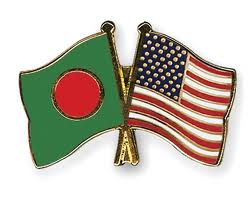 The United States established diplomatic relations with Bangladesh in 1972 following its independence from Pakistan. U.S.-Bangladesh relations are excellent and reflect the two countries’ strong bonds of friendship and shared values. Bangladesh is a key U.S. strategic partner in South Asia. The country’s efforts at development, countering violent extremism, assisting international peacekeeping, and improving regional connectivity are vital to regional and global stability. The U.S.-Bangladesh Partnership Dialogue advances shared bilateral, regional, and global objectives and gives strategic direction to ongoing and future cooperative activities. The second U.S.-Bangladesh Partnership Dialogue meeting, held in Dhaka May 26-27, 2013, covered a wide variety of topics: democracy and governance, trade and investment, security cooperation and regional integration.
The United States established diplomatic relations with Bangladesh in 1972 following its independence from Pakistan. U.S.-Bangladesh relations are excellent and reflect the two countries’ strong bonds of friendship and shared values. Bangladesh is a key U.S. strategic partner in South Asia. The country’s efforts at development, countering violent extremism, assisting international peacekeeping, and improving regional connectivity are vital to regional and global stability. The U.S.-Bangladesh Partnership Dialogue advances shared bilateral, regional, and global objectives and gives strategic direction to ongoing and future cooperative activities. The second U.S.-Bangladesh Partnership Dialogue meeting, held in Dhaka May 26-27, 2013, covered a wide variety of topics: democracy and governance, trade and investment, security cooperation and regional integration.
Bangladesh has made progress toward a more prosperous and democratic society. Despite improvements, much of the population still lives in poverty and the country faces major vulnerabilities in the areas of infrastructure shortcomings, governance, and potential terrorist exploitation by extremist groups. These challenges are compounded by the fact that Bangladesh is one of the most densely populated countries in the world.
U.S. Assistance to Bangladesh
U.S. assistance seeks to foster robust engagement with the Government of Bangladesh and complement support from other donors to address the underlying social, demographic, and economic factors that threaten democratic governance, stifle economic growth, and increase vulnerability to extremism in Bangladesh. The United States aims to build on previous gains to further reduce poverty and food insecurity, improve health and education, mitigate the impact of frequent natural disasters, and achieve more effective governance in order to foster equitable and sustainable growth.
Bilateral Economic Relations
U.S. exports to Bangladesh include agricultural products (cotton, wheat, dairy products), aircraft, machinery, and iron and steel products. U.S. imports from Bangladesh include apparel, other textile products, headgear, shrimp and prawns, and agricultural products (primarily tobacco). The United States is one of Bangladesh’s largest export markets. The two countries have signed a bilateral investment treaty and a bilateral treaty for the avoidance of double taxation. Bangladesh provides several tax, foreign exchange, customs, and labor incentives to investors in its export processing zones. On June 27, 2013, President Barack Obama suspended Bangladesh’s designation as a beneficiary country under the Generalized System of Preferences (GSP) program, citing Bangladesh’s inability to take steps to adopt internationally recognized workers rights. The decision to suspend Bangladesh’s designation came after a multi-year review by the U.S. Trade Representative.
Bangladesh’s Membership in International Organizations
Bangladesh and the United States belong to a number of the same international organizations, including the United Nations, ASEAN Regional Forum, International Monetary Fund, World Bank, and World Trade Organization.
